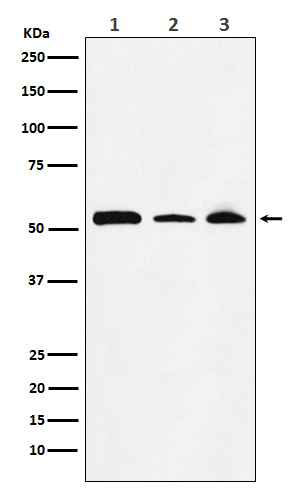NONO / p54nrb Rabbit mAb [tx14]Cat NO.: A81088
Western blot(SDS PAGE) analysis of extracts from (1) MOLT4 cell lysate; (2) NIH/3T3 cell lysate; (3) PC12 cell lysate.Using NONO / p54nrb Rabbit mAb [tx14]at dilution of 1:1000 incubated at 4℃ over night.
Product information
Protein names :P54; NMT55; NRB54; P54NRB;
UniProtID :Q15233
MASS(da) :54,232
MW(kDa) :54kDa
Form :Liquid
Purification :Affinity-chromatography
Host :Rabbit
Isotype : IgG
sensitivity :Endogenous
Reactivity :Human,Mouse,Rat
- ApplicationDilution
- 免疫印迹(WB)1:1000-2000
- 免疫组化(IHC)1:100
- 免疫荧光(ICC/IF)1:100
- The optimal dilutions should be determined by the end user
Specificity :Antibody is produced by immunizing animals with A synthesized peptide derived from human NONO / p54nrb
Storage :Antibody store in 10 mM PBS, 0.5mg/ml BSA, 50% glycerol. Shipped at 4°C. Store at-20°C or -80°C. Products are valid for one natural year of receipt.Avoid repeated freeze / thaw cycles.
WB Positive detected :(1) MOLT4 cell lysate; (2) NIH/3T3 cell lysate; (3) PC12 cell lysate.
Function : DNA- and RNA binding protein, involved in several nuclear processes (PubMed:11525732, PubMed:12403470, PubMed:26571461). Binds the conventional octamer sequence in double-stranded DNA (PubMed:11525732, PubMed:12403470, PubMed:26571461). Also binds single-stranded DNA and RNA at a site independent of the duplex site (PubMed:11525732, PubMed:12403470, PubMed:26571461). Involved in pre-mRNA splicing, probably as a heterodimer with SFPQ (PubMed:11525732, PubMed:12403470, PubMed:26571461). Interacts with U5 snRNA, probably by binding to a purine-rich sequence located on the 3' side of U5 snRNA stem 1b (PubMed:12403470). Together with PSPC1, required for the formation of nuclear paraspeckles (PubMed:22416126). The SFPQ-NONO heteromer associated with MATR3 may play a role in nuclear retention of defective RNAs (PubMed:11525732). The SFPQ-NONO heteromer may be involved in DNA unwinding by modulating the function of topoisomerase I/TOP1 (PubMed:10858305). The SFPQ-NONO heteromer may be involved in DNA non-homologous end joining (NHEJ) required for double-strand break repair and V(D)J recombination and may stabilize paired DNA ends (PubMed:15590677). In vitro, the complex strongly stimulates DNA end joining, binds directly to the DNA substrates and cooperates with the Ku70/G22P1-Ku80/XRCC5 (Ku) dimer to establish a functional preligation complex (PubMed:15590677). NONO is involved in transcriptional regulation. The SFPQ-NONO-NR5A1 complex binds to the CYP17 promoter and regulates basal and cAMP-dependent transcriptional activity (PubMed:11897684). NONO binds to an enhancer element in long terminal repeats of endogenous intracisternal A particles (IAPs) and activates transcription (By similarity). Regulates the circadian clock by repressing the transcriptional activator activity of the CLOCK-ARNTL/BMAL1 heterodimer (By similarity). Important for the functional organization of GABAergic synapses (By similarity). Plays a specific and important role in the regulation of synaptic RNAs and GPHN/gephyrin scaffold structure, through the regulation of GABRA2 transcript (By similarity). Plays a key role during neuronal differentiation by recruiting TET1 to genomic loci and thereby regulating 5-hydroxymethylcytosine levels (By similarity). Plays a role in the regulation of DNA virus-mediated innate immune response by assembling into the HDP-RNP complex, a complex that serves as a platform for IRF3 phosphorylation and subsequent innate immune response activation through the cGAS-STING pathway (PubMed:28712728, PubMed:30270045). Promotes activation of the cGAS-STING pathway in response to HIV-2 infection: acts by interacting with HIV-2 Capsid protein p24, thereby promoting detection of viral DNA by CGAS, leading to CGAS-mediated inmmune activation (PubMed:30270045). In contrast, the weak interaction with HIV-1 Capsid protein p24 does not allow activation of the cGAS-STING pathway (PubMed:30270045)..
Tissue specificity :Heart, brain, placenta, lung, liver, skeletal muscle, kidney and pancreas. Also found in a number of breast tumor cell lines..
Subcellular locationi :Nucleus. Nucleus, nucleolus. Nucleus speckle. Chromosome.
IMPORTANT: For western blots, incubate membrane with diluted primary antibody in 1% w/v BSA, 1X TBST at 4°C overnight.


